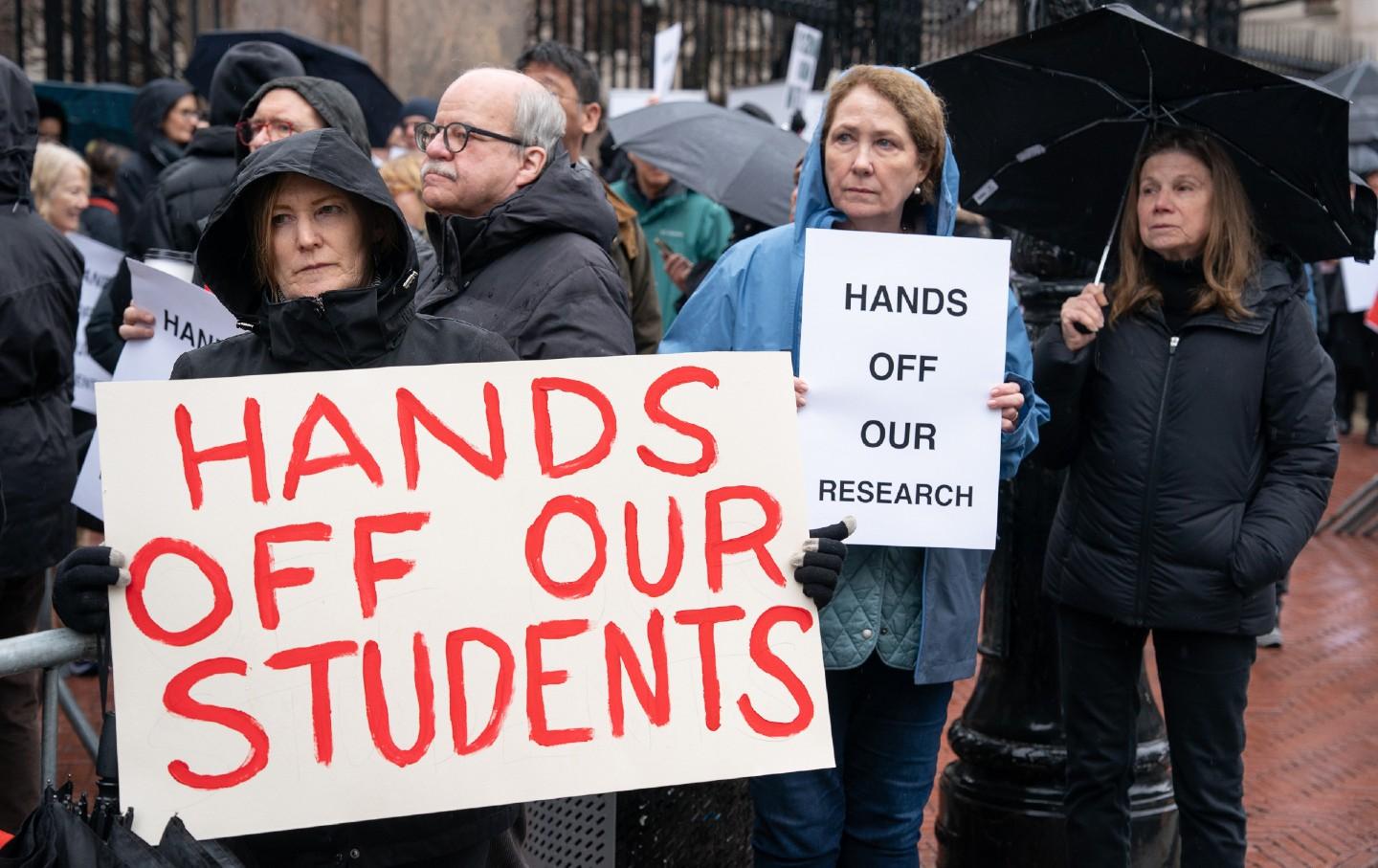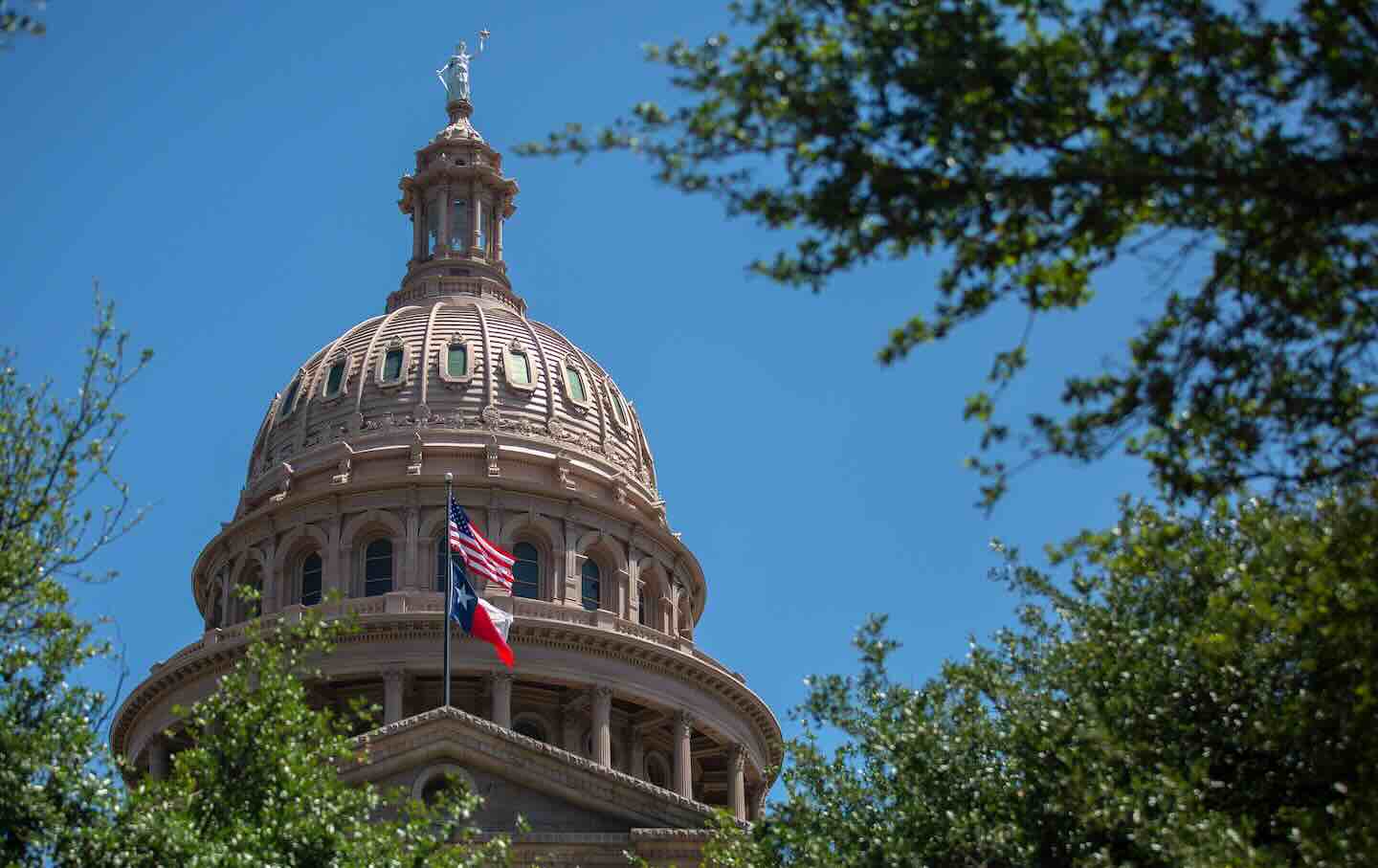Why Universities Must Start Litigating—and How
The litigation would afford schools a high-profile venue in which to detail the Trump administration’s lawlessness and aggression.

The Trump administration’s assault on higher education continues to escalate. The White House has pressured universities into shutting down diversity and equity programs of all sorts, terminated hundreds of millions of dollars in research grants inconsistent with its political agenda, and moved to slash reimbursements for the grants that remain. The Department of Education has opened investigations into more than 60 colleges and universities. Most alarming, the Department of Homeland Security has started sending agents onto campuses across the country to arrest and deport noncitizen students and faculty who have engaged in pro-Palestinian advocacy.
In hindsight, all of this looks predictable. Vice President Vance gave a speech in 2021 titled “The Universities Are the Enemy.” The Heritage Foundation’s Project Esther calls for the use of counterterrorism tactics to “disrupt and degrade” student activism in the name of combating antisemitism. And attacks on universities’ finances and freedoms have become a defining feature of authoritarian regimes worldwide. Even so, the speed and scale of President Trump’s effort to tear down higher education has been shocking to many in the field. After decades of enjoying a mutually beneficial partnership with the federal government, university leaders have struggled to find their bearings as their chief patron has turned against them.
Columbia University is currently the leading case in point. Citing “the school’s continued inaction in the face of persistent harassment of Jewish students,” the Trump administration announced on March 7 the “immediate cancellation” of $400 million in contracts and grants. Less than a week later, the administration sent Columbia a list of demands, including changes to academic policies and internal governance bodies with little connection to antisemitism, as “a precondition for formal negotiations regarding Columbia University’s continued financial relationship with the United States government.” Both the immediate funding cutoff and the extortionate demand letter are unprecedented in the history of US higher education. Columbia acceded to a modified version of each demand. The White House pocketed those concessions and, by all appearances, promptly forced out the university’s interim president.
It is unclear at this time whether Columbia will ever get the $400 million back. From a legal perspective, the remarkable thing is that the university has not already tried. For as numerous scholars (including two of us) have pointed out—and as no expert inside or outside the government has denied—the Trump administration’s demand letter is unlawful six ways to Sunday. The demands do not comply with the procedural or substantive rules of the federal statute on which they are based, and they violate the due process rights of the university and its researchers, as well as First Amendment guarantees of academic freedom. The illegality of the government’s effort to punish and control Columbia is not a close call.
So, why didn’t Columbia simply tear up the demand letter and sue? The most fundamental reason is that the university receives close to $1.5 billion per year in federal funds, and a vindictive president could try to cut much of that money on some other pretext. In addition to being costly and time-consuming, litigation to recover the $400 million might prove a pyrrhic victory if the government were to respond by inflicting even greater economic pain. Columbia’s board of trustees is a risk-averse, business-oriented group—like most contemporary university boards—and certain trustees may be not just grudgingly acquiescent but genuinely enthusiastic about certain reforms they have made in response to Trump’s demands. But even the most outraged academic leaders must think twice before suing this administration.
Recognizing as much, universities nationwide have given little indication that they intend to fight back in court against the defunding of their scientists or the deportation of their students. Hardly any university leaders said a word in defense of Columbia. (Nor, for that matter, did New York’s Democratic governor or its Democratic senators.) Less than a week after issuing its demand letter to Columbia, the Trump administration suspended $175 million in federal grants to the University of Pennsylvania because the school allowed a transgender woman to compete on its women’s swimming team several years ago. This funding cutoff is legally dubious on some of the same grounds as the Columbia cutoff, yet there are no reports that Penn is planning to sue. Other institutions are engaging in similar anticipatory obedience, shuttering diversity offices and climate initiatives, abandoning policies aimed at transgender inclusion, and clamping down on outspoken Middle Eastern studies scholars.
The result is a classic race to the bottom. University administrators are sacrificing more and more of their academic mission in the hope of avoiding additional funding cuts or, worse, escalating state violence against the most vulnerable members of their community. This is unfolding in plain sight, notwithstanding that leading scholars of fascism have made it crystal clear that only concerted collective action stands a chance against such authoritarian predations.
Attempting to fight on universities’ behalf, organizations like the American Association of University Professors, the American Federation of Teachers, and the Knight First Amendment Institute have filed lawsuits challenging the suspension of funds and the potential deportation of students for their constitutionally protected speech. In many ways, these and similar suits model the sort of faculty governance that has all but disappeared from American higher education in recent years—an absence that helped yield the present moment. Pockets of legal courage still exist.
Such organizations, however, lack the material resources and media-generating capacity of rich universities. They will not always be able to assert some of the strongest legal claims, which belong to the universities themselves when their institutional interests have been threatened. Even more frustratingly, these organizations cannot prevent administrators and trustees from conceding defeat before a complaint can be filed. Lawsuits brought by people in and around universities are at best a partial substitute for universities’ failure to bring their own lawsuits against the government.
To protect both themselves and the entire educational system, then, university leaders should commit, collectively and immediately, to challenge unlawful demands that threaten academic freedom and university self-governance. Nothing in the antitrust laws prohibits this sort of coordination. To further reduce the risk of “being picked off one by one,” schools could also promise to support one another in litigation by submitting amicus briefs, joining suits that raise common issues, and (for sufficiently widespread issues) filing class actions. A version of this approach was recently proposed by the Rutgers University Senate, in the form of a “Mutual Defense Compact” for Big Ten schools. Any such shared effort would likely result in a series of court victories, at least in early rounds, given the statutory and constitutional carelessness with which the government has been operating.
Filing lawsuits would do more than produce judicial decisions ordering the government to return specific funds. The litigation would afford schools a high-profile venue in which to detail the Trump administration’s lawlessness and aggression. By standing up to such threats, the lawsuits would also send the message that civil society institutions have a duty to defend basic democratic and rule-of-law norms, a message that must be communicated in word and deed to unsettle the culture of capitulation that has begun to take hold, not just in higher education but throughout the legal profession.
Perhaps most importantly, filing lawsuits would lay the legal groundwork for challenging any future funding cuts or other punitive measures taken on pretextual or retaliatory grounds—thereby alleviating the pyrrhic-victory concern—while buying time for universities to make their case in the court of public opinion. This effort will have to involve defending the value of the academy to Congress and the American people. Working together, universities can highlight the importance of scientific research to economic growth and social progress, along with the centrality of humanistic thought to a functioning democracy.
Popular
“swipe left below to view more authors”Swipe →As crucially, universities must acknowledge the rightful concerns about exclusion, elitism, and the reproduction of privilege that have corroded support for higher education over decades. This parallel effort cannot be a mere PR campaign. By committing to material concessions such as reduced tuition and increased enrollments, academic leaders could begin to address the populist anger that Trump and his allies have thus far been able to exploit.
Litigation is an imperfect and limited tool. It is nonetheless a necessary tool if universities are to survive long enough—as morally and intellectually self-respecting communities as well as financially solvent enterprises—to mount a more robust, coordinated defense. The fight over the future of higher education will not ultimately be settled in court. But the fight will definitely be lost if it doesn’t go there at all.








